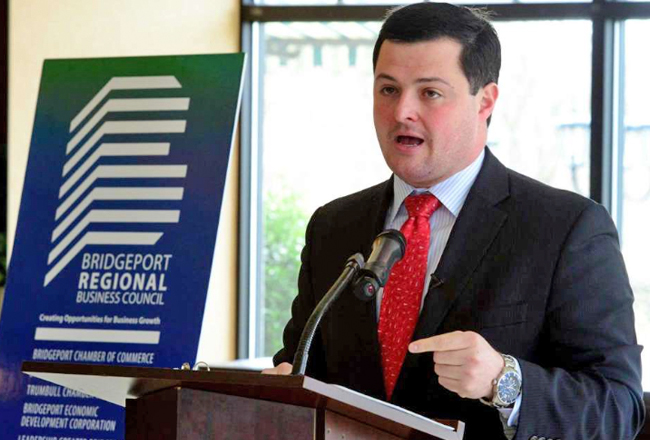
When Mark A. Lauretti first became the mayor of Shelton in 1991, Connecticut was beginning to see the start of a corporate exodus.
“There were 45 Fortune 500 companies that left Connecticut since 1991,” said the Republican Lauretti. “The first one was UPS. Lowell Weicker was the governor and he implemented the income tax ”” and they said, ”˜If you do that, we are leaving.”™ Twenty-five years later, they”™re in Atlanta and they”™re not coming back.”
Fast-forward a quarter-century and the departure of major corporations from Connecticut is still an economic concern, with General Electric leaving Fairfield last year and Aetna dominating today”™s headlines with reports that it is ready to relocate its Hartford headquarters. In his view, Lauretti blames the political strategy of appeasing major companies with financial incentives as contributing to the problem.
“Quite honestly, when Cigna got their $50 million five or six years ago, what prevented anyone from walking into the governor”™s office and saying, ”˜I want the same thing or I”™m leaving”™?” he asked. “That”™s the risk that you run when you start picking winners and losers and when you have to pay people to stay here because you”™re not affordable. That has become a very sad commentary for Connecticut.”
“Last year, we pulled two big companies into Shelton ”” Unilever and United Healthcare ”” with over 1,600 employees total,” Lauretti said. “The bad news is that we pulled them from other places in Connecticut. Unilever and United Healthcare came from Trumbull. Hubbell was in Orange for 100 years ”” now they”™re in Shelton. Bic was in Milford for 50 years ”” they”™re now in Shelton.”
Why did these big companies move to Fairfield County”™s smallest city? Lauretti admitted that Shelton is lacking the mass transit options, colleges and universities and major medical facilities that the region”™s larger metro areas enjoy. Despite the absence of those advantages, he stressed the importance of fostering an environment where businesses are valued and not used by local government as cash cows.
“We haven”™t raised taxes in nine years and that is what businesses want and need,” he said. “We have 1,500 businesses in Shelton and, on any given day, 25,000 people commute in here. So, we”™ve become an employment hub. When you bring in that amount of people to come to work, they need services. There are reasons why there are six hotels (in Shelton) and a whole variety of restaurant opportunities.”
Not everyone is enamored with this level of development. A local group calling itself SOS Save Our Shelton LLC has taken up the fight to block the creation of Towne Center at Shelter Ridge, a mixed-use project featuring 375 apartments, a retail shopping center and medical and professional offices. The city”™s Planning and Zoning Commission voted 4-2 in April to approve a zone change to enable forest and farmland clearing and redesigned roadways to accommodate the development, but SOS Save Our Shelton, which says it is as “concerned with high-density residential and retail development” ”” is running a GoFundMe campaign to raise money for a legal challenge to the project.
For his part, Lauretti was dismissive of SOS Save Our Shelton, wondering just what the group was saving the city from. “This is probably the third time I”™ve gone through this since being elected mayor in 1991,” he said. “We have predetermined areas in the town for economic growth. They think it is going to have an impact on them, but I respectfully disagree with that. When you have an area of the town that is not productive and bringing in zero revenue, you have to bring it to a point where it can bring in positive revenue.”
Lauretti has set his sights beyond Shelton. Earlier this year, he announced that he would be pursuing the Republican Party nomination for the Connecticut governorship. He is using his lengthy mayoralty as evidence of what he could accomplish in Hartford.
“I think I can make a difference,” he said. “That”™s why I got into this job 26 years ago in Shelton. We had empty storefronts, we had homeless people, we had drug issues, we had fires, we had abandoned factory buildings. We transformed all of that. We transformed this mill town into an employment hub with a pretty good quality of life.”
And what would be Lauretti”™s first order of business if elected? “We need to get rid of the estate tax because it has become a big deterrent and pushed wealth out of our state and we get very little in return,” he said.
Lauretti will have to prove himself against an increasingly crowded field of challengers, including a pair of Fairfield County elected officials, Danbury Mayor Mark Boughton and Trumbull First Selectman Tim Herbst. Lauretti also has an admittedly dismal track record in statewide office campaigns, with failed efforts in 2010 and 2014 to secure his party”™s nomination. Yet he still believes that he is the right man for the job.
“I”™m motivated by the challenge,” he said. “Connecticut deserves a lot better than what is happening here.”






















